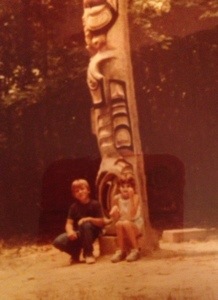I was almost 18 when I knew for sure that my Bubbie hated me.
I was visiting her on a sunny Saturday at the end of summer, days before I started college. Earlier we had gone shopping for dorm room supplies: pillows, a trash can, a shower caddy, that sort of thing. The purchases sat by her door still in their bags.
We had just returned from lunch and my mom and my aunt were talking quietly in the kitchen.
“Come with me,” Bubbie said. “I have something to show you.”
“Okay,” I said and followed her as she shuffled into her bedroom. The bedspread laid smoothly over the bed, her knitted afghan over top. Her rocker sat in one corner. Sun streamed through the lace curtains.
“Sit here,” she said, motioning towards the bench at her vanity table.
I did. She opened her jewelry box sitting atop her vanity, her hands shaking slightly. “Look at these,” she said, lifting out a pair of gold earrings.
“They’re pretty,” I said. Bubbie loved jewelry almost more than she loved shopping. Ever since my grandfather died in World War II, she had saved carefully to buy herself rings, necklaces, earrings. At 82, her large collection was her pride.
I ran my fingers across the rows of pretty necklaces. I loved when Bubbie showed me her things like this; sneaking off felt secret and special.
“I like this one,” I said, lifting a large ring with a swirling pattern of diamonds out of the box. I smiled and looked up at Bubbie, expecting her agreement.
No. Suddenly something was wrong. Her face had turned stony.
“Don’t touch that,” she ordered. “That one belongs to your sister when I’m gone.”
Her words froze me. The ring dropped back into the jewelry box. For a long minute I tried to make sense of Bubbie’s words.
I didn’t want Bubbie to be gone. I never wanted any of her jewelry if it meant that she was dead. I hadn’t asked for the ring, I hadn’t even wanted it. But even if I had, why would she choose to reward my sister over me? Why reward a no-good drug addict who deserted her family and not me? I had always worked hard and received a scholarship to college. I visited her each Saturday, not Kim. I always did the right thing, unlike Kim. I loved my Bubbie.
All of a sudden, a blinding rage came over me. I jumped up, pushed over the bench, and ran out of the room. I ran to the front door and grabbed my new pillow and a few other shopping bags and slammed the front door behind me. I could hear my mom calling me from the kitchen, but I ignored her. I ran to the bus stop and sat, clutching my pillow, crying.
A few minutes later, my mom arrived. As we waited for the approaching bus, she told me, “Whatever you just did, Bubbie will never forgive you for it.” I looked at her in disbelief.
You know what? My mom was right. I apologized many times, but my Bubbie never did forgive me. You’d be surprised how old she was when she died.








